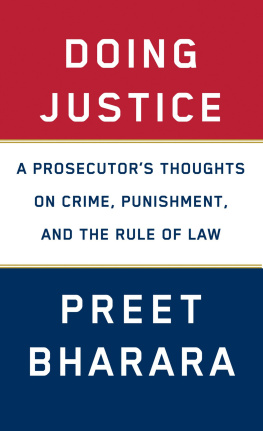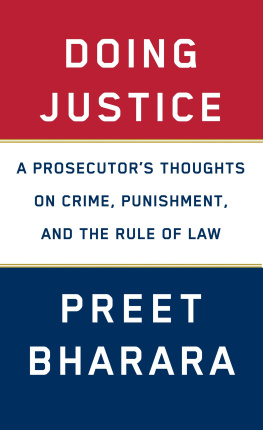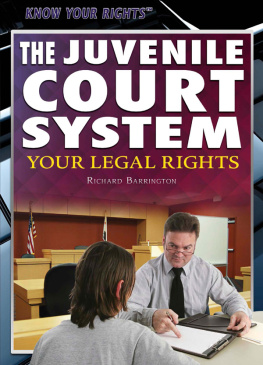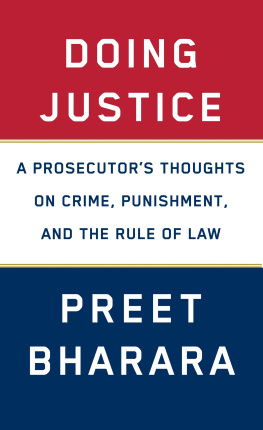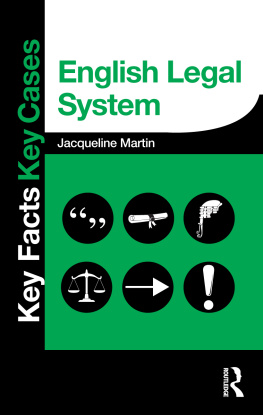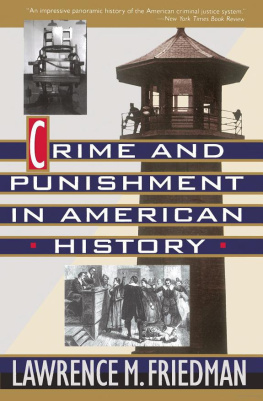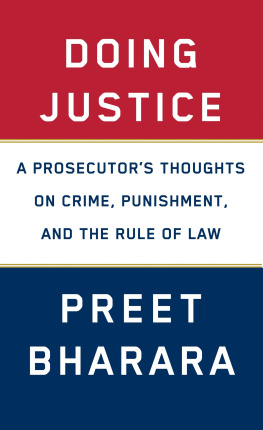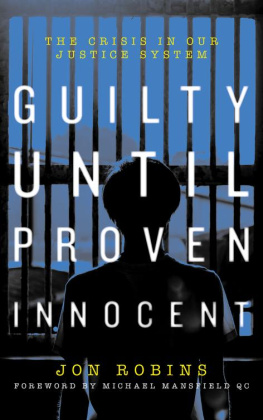Acknowledgments
Despite its length, this book hardly scratches the surface of what I hoped to convey about doing justice and about the office I served for thirteen years. I could not tell every story, discuss every lesson, address every setback, highlight every hero. Some little-known cases are treated in detail; many high-profile matters make no appearance at all, or barely so. Nonetheless, it is the sum of all my experiencesin big cases and small, in those I handled personally and in those I oversawthat animates every smart and stupid thought I set down. The errors are mine, and my debts are many.
I want to thank first my extraordinary editor, Peter Gethers, who I believe was destined to edit this book. Peter reached out to me on a lark, unsolicited and out of the blue some years back, when I was midway through my tenure as U.S. Attorney. No book was in the offing, but a friendship was born. Im blessed that Peter believed in me as a public servant first and as an author second, which is the right order. He wielded his editorial pencilyes, pencil, no red pens for Peterkindly but mercilessly, which has made this thing much better than I could have hoped. Thanks also to Sonny Mehta for his support and faith in this work and all the fine folks at Knopf, including Janna Devinsky, Paul Bogards, Erinn Hartman, Jessica Purcell, Nicholas Latimer, Chris Gillespie, Sara Eagle, and Carol Carson.
My literary agent, Elyse Cheney, was my friend and champion throughout this process. Over lengthy and thoughtful sessions, usually filled with laughter, Elyse and Alice Whitwham helped me sharpen my thinking, flesh out my structure, and find my voice. Thanks also to Claire Gillespie and Alex Jacobs of Elyse Cheney Literary Associates for their work.
Im supremely grateful to Erik Kahn and Douglas Winters of Bryan Cave for their early support and their legal counsel.
I had loads of help from my colleagues at CAF, where I make my podcasts. In a hundred ways, Vinitwho does double duty as my brother and my bosshelped me write this book, with resources and advice and faith. Several fine people at CAF managed and shepherded so many aspects of this bookTamara Sepper, Julia Doyle, Vinay Basti, and Jared Milfred, who helped me review, refine, and research. Julia and Vinay in particular burned the candle at both ends, investigating cases, scouring transcripts, proofreading chapters, and turning some of my dictated dreck into passable prose.
I am incredibly grateful to the scholars and students at New York University Law School, where I work under the lofty title Distinguished Scholar in Residence. Thanks first to my superb law student assistants Sara Bodner, Rupinder Garcha, and Ravi Singh for their insight, rigor, research, and keen eyes. Im also indebted to the terrifically smart students in the Justice seminar I teach at NYU Law, with whom I discussed many of the cases and quandaries elaborated upon in this book. Finally, I am grateful to my friend and NYU Law Dean, Trevor Morrison, for his unfailing encouragement and support.
Heres a confession: I committed at one time or another every sin warned against in these pagesI let a victims pain float out of my mind; forgot to think I might be mistaken; deviated from exactitude under the press of work; held stubbornly to a view for too long; withheld a question I thought too dumb to verbalize. What saved me, most of the time, was the excellence and integrity of the most hardworking and idealistic people I have ever knownmy colleagues in and around the SDNY. This book is, in a way, for and about them. And this book exists only because of them.
My SDNY deputiesBoyd Johnson, Rich Zabel, and Joon Kimare three of my dearest friends, closest advisers, and greatest influences. They are also superb editors. Each provided inspiration, guidance, and everlasting friendship, which is what one really needs most, in any endeavor.
There are countless more friends and colleaguestoo many to mention all by name and I fear Ive inadvertently left some outwho sat with me, counseled me, corrected me, steered me, edited me, taught me. Many are mentioned in the telling of these stories, but I also want to thank by name Anirudh Bansal, Rachel Barkow, Marc Berger, Michael Bosworth, Perry Carbone, Chris Conniff, James Cott, Michael Farbiarz, Nicole Friedlander, Jesse Furman, Jessica Goldsmith-Barzilay, Nola Heller, Bill Johnson, Bonnie Jonas, Jonathan Kolodner, Amanda Kramer, Paul Krieger, Joan Loughnane, Brendan McGuire, Anne Milgram, Lou Millione, Lisa Monaco, Marc Racanelli, Mimi Rocah, David Rody, Anjan Sahni, Yusill Scribner, Dan Stein, and Jocelyn Strauber.
I mention a host of SDNY investigators in the book because they are the true unsung heroes of my former office, but I also want to thank their supervisors Eric Blachman and Keith Talbert. There are also too many special agents, cops, inspectors, analysts and others to mention here. I am indebted to all of themafter all, they made the cases that make up this book. FBI heads George Venizelos, Diego Rodriguez, Joe Demarest, Janice Fedarcyk. Also Ray Kelly, Bill Bratton, Jimmy ONeil, John Miller, and so many others at the NYPD. All the hardworking heroes at DEA, ATF, IRS, HSI, DOI, Postal, and more. Im forever thankful for their friendship, leadership, and service.
Senator Charles Schumer, for whom I worked during a tumultuous and important time on the Senate Judiciary Committee, gets my eternal thanks and a standalone paragraph because I became the U.S. Attorney only on account of his recommendation to President Obama. He thought I could do that big job before many others did and so, outside of my immediate family, no one has shown more faith in my professional ability than Senator Schumer, the hardest working person I have ever met.
Now, my family: I am deeply thankful to my wife, Dalya, who was the portrait of loving patience. She read every page of every draft and offered inspired edits on every version, over more than eighteen arduous months. She tolerated my absence, my stress, and my petulance. She talked me through each wretched insecurity and writers block, and her pen saved me considerable embarrassment. She was both encouraging and unsparing, in perfect balance. That is quite a feat and precisely what you wish for in a spousal editor. Thank you.
My three beautiful childrenMaya, Jaden, and Rahmdid not line-edit my manuscript, but every day they ground me, enliven me, inspire me, and make me realize how much they deserve to live in a fair and just society. Inasmuch as this book is about the future, it is for them.
I end with thanks and blessings to my Mom and Dad: Jagdish and Desh Bharara. They brought me from India to America as an infant, forty-nine years before I published this book. They are not lawyers, didnt especially want me to become a lawyer. But they were the first to teach me about justice, fairness, and the importance of principlejust by quietly demonstrating those virtues and values every day. As they do still.
A N OTE A BOUT THE A UTHOR
Preet Bharara is an American lawyer who served for seven and a half years as U.S. Attorney for the Southern District of New York from 2009 to 2017. As U.S. Attorney, Bharara oversaw the investigation and litigation of all criminal and civil cases brought on behalf of the United States in the Southern District of New York. He supervised an office of more than two hundred Assistant U.S. Attorneys, who handled a high volume of cases involving terrorism, narcotics and arms trafficking, financial and healthcare fraud, cybercrime, public corruption, gang violence, organized crime, and civil rights violations.
In 2012, Bharara was featured on the cover of Time magazine and its list 100 Most Influential People in the World. From 2012 to 2016, Bharara was also included in Vanity Fairs New Establishment lists,

